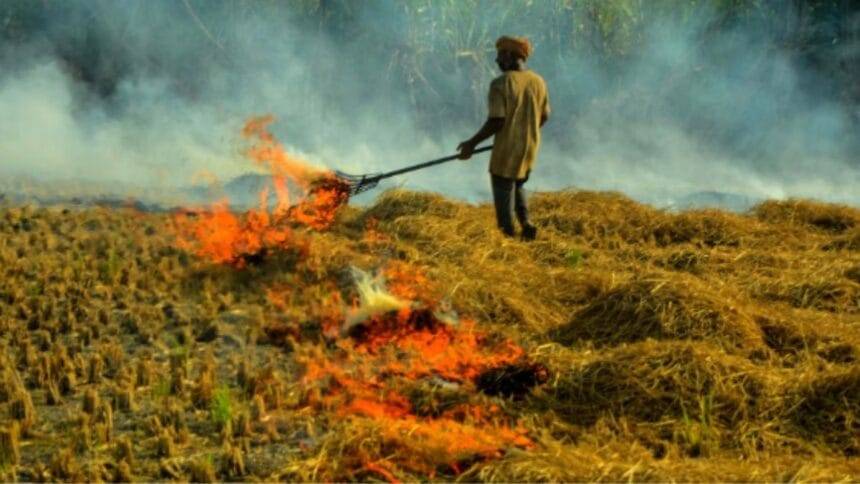Main Points In Hindi (मुख्य बातें – हिंदी में)
यहाँ पर हरियाणा कृषि विभाग द्वारा उठाए गए कदमों के मुख्य बिंदु दिए गए हैं:
-
एफआईआर और रिकॉर्ड में "रेड एंट्री": हरियाणा कृषि विभाग ने कथित रूप से स्टबल बर्निंग करने वाले किसानों के खिलाफ एफआईआर दर्ज करने और उनके खेतों के रिकॉर्ड में "रेड एंट्री" दर्ज करने का निर्णय लिया है, जिससे उन्हें अगले दो सत्रों के लिए ई-प्रोक्योरमेंट पोर्टल के माध्यम से अपनी फसलें बेचने से रोका जाएगा।
-
कानूनी कार्रवाई के प्रावधान: 17 अक्टूबर, 2024 को जारी किए गए आदेश के अनुसार, 15 सितंबर, 2024 के बाद पेडी फसल के अवशेष जलाने वाले सभी किसानों को विधिक परिणामों का सामना करना पड़ेगा।
-
फायर मामलों की रिपोर्ट: कृषि विभाग ने 15 सितंबर से 13 अक्टूबर के बीच 468 स्टबल बर्निंग के मामलों की रिपोर्ट की, लेकिन कई मामलों में गड़बड़ियों का दावा किया गया, जिसमें से 173 मामलों में आग नहीं लगी थी।
-
CRM मशीनों और प्रोत्साहन: हरियाणा सरकार ने किसानों को किफायती दरों पर फसल अवशेष प्रबंधन (CRM) मशीनें प्रदान की हैं और इन मशीनों के उपयोग पर प्रति एकड़ 1,000 रुपये का प्रोत्साहन दिया जा रहा है।
- स्थानीय जागरूकता अभियान: हरियाणा के कई गांवों में किसानों और आम लोगों को स्टबल बर्निंग के खिलाफ जागरूक किया जा रहा है, और स्कूलों में बच्चों को शिक्षित किया जा रहा है ताकि वे अपने माता-पिता को इस समस्या के बारे में जानकारी दें।
Main Points In English(मुख्य बातें – अंग्रेज़ी में)
Here are the main points regarding the Haryana Agriculture Department’s measures to address stubble burning:


-
Legal Consequences for Stubble Burning: The Haryana Agriculture Department announced that farmers found guilty of burning paddy stubble after September 15, 2024, will face legal action, including the filing of FIRs and a "red entry" in their farm records, which will bar them from selling their crops through the e-procurement portal for two seasons.
-
Concerns Over Air Quality: This initiative is a response to the ongoing issues of deteriorating air quality and environmental harm linked to stubble burning, with a recent report highlighting the registration of red entries for 232 farmers as of October 14.
-
Deployment of Nodal Officers and Machinery Incentives: To combat stubble burning, the Haryana government has appointed 3,224 nodal officers and is providing crop residue management machines at reduced rates. Additionally, farmers receive financial incentives for using these machines and for transporting paddy straw to cow sheds.
-
Awareness Campaigns: The government is actively conducting awareness campaigns in villages, educating both adults and children on the importance of not burning stubble. This initiative aims to promote alternative uses of stubble, such as fodder for livestock.
- Unique Practices in Nuh District: In contrast to the prevalent stubble burning in many areas, farmers in Nuh district are utilizing paddy stubble as animal fodder instead of burning it, demonstrating a successful, eco-friendly practice that contributes to both agricultural sustainability and local economies.
Complete News In Hindi(पूरी खबर – हिंदी में)
हरियाणा कृषि विभाग ने फसल अवशेष जलाने की समस्या से निपटने के लिए एक बड़ा कदम उठाया है। कृषि विभाग ने कहा है कि जो किसान फसल अवशेष जलाएंगे, उनके खिलाफ FIR दर्ज की जाएगी। साथ ही, उनके फसल रिकॉर्ड में “रेड एंट्री” की जाएगी, जिससे वे अगले दो सीज़नों तक अपने फसल को ई-प्रोक्योरमेंट पोर्टल के माध्यम से नहीं बेच पाएंगे।
17 अक्टूबर 2024 को जारी यह आदेश खराब एयर क्वालिटी और फसल अवशेष जलाने से होने वाले पर्यावरणीय नुकसान की चिंताओं के कारण आया है। इस निर्देश में कहा गया है कि 15 सितंबर 2024 के बाद, जो किसान धान के फसल अवशेष जलाते हुए पकड़े जाएंगे, उन्हें संबंधित कानूनों के तहत कानूनी कार्रवाई का सामना करना पड़ेगा। यह पहल उस रिपोर्ट के बाद आई है जो एयर क्वालिटी मैनेजमेंट कमीशन (CAQM) को सौंपी गई थी, जिसमें कहा गया था कि 14 अक्टूबर तक 232 किसानों के खिलाफ रेड एंट्री दर्ज की जा चुकी थी।
कृषि विभाग का निर्णय
इन नए उपायों को लागू करने के महत्व पर 14 अक्टूबर को एक बैठक में जोर दिया गया। इस बैठक में विभिन्न जिलों के उप आयुक्त शामिल हुए। बैठक के दौरान, हरियाणा के कृषि विभाग ने बताया कि 15 सितंबर से 13 अक्टूबर के बीच 468 फसल अवशेष जलाने के मामले दर्ज किए गए। हालांकि, कुछ मामलों में अनियमितताएं पाई गईं, जिसमें 173 मामलों में कोई आग नहीं लगी और चार मामलों में आग गैर-कृषि भूमि पर या कचरा जलाने के कारण लगी थी।
हरियाणा सरकार ने फसल अवशेष जलाने से निपटने के लिए 3,224 नोडल अधिकारियों को तैनात किया है और किसानों को फसल अवशेष प्रबंधन (CRM) मशीनें रियायती दरों पर प्रदान की हैं। राज्य सरकार इस मशीन की खरीद पर प्रोत्साहन भी दे रही है। राज्य सरकार प्रति एकड़ 1,000 रुपये का प्रोत्साहन दे रही है जब किसान CRM मशीनों का उपयोग करते हैं और प्रति एकड़ 500 रुपये का प्रोत्साहन धान की भूसी को गोशालाओं में लाने के लिए।
नूह में अच्छी पहल
हरियाणा के कई गाँवों में किसानों और आम लोगों को फसल अवशेष न जलाने के लिए जागरूक किया जा रहा है। स्कूलों में बच्चों को भी इस बारे में जानकारी दी जा रही है ताकि वे अपने माता-पिता को फसल अवशेष न जलाने के लिए प्रेरित कर सकें। कृषि विभाग के डीडीए ने बताया कि नूह जिले में लगभग 13,000 हेक्टेयर भूमि पर धान की फसल है। नूह जिले में पूरी धान की फसल हाथ से काटी जाती है। मैनुअल कटाई के बाद किसान फसल अवशेष को अपने जानवरों के लिए चारा के रूप में उपयोग करते हैं।
नूह और आसपास के क्षेत्रों के मवेशी किसान धान की भूसी खरीदते हैं और ले जाते हैं। कुल मिलाकर, जैसे-जैसे सर्दी का मौसम शुरू होता है, NCR गैस चैंबर बन जाता है और इसके कारण लोग प्रदूषण के कारण सांस लेने में दिक्कत महसूस करते हैं। लेकिन हरियाणा के नूह जिले में किसान फसल अवशेष को जलाने के बजाय चारे के रूप में उपयोग कर रहे हैं। यह हरियाणा का एक अनोखा जिला है, जहाँ फसल अवशेष सिरदर्द नहीं, बल्कि लाभकारी सौदा बन गया है।
Complete News In English(पूरी खबर – अंग्रेज़ी में)
Haryana Agriculture Department announced a big step to deal with the problem of stubble burning. The Agriculture Department said that an FIR will be registered against the farmers who burn stubble. Additionally, a “red entry” will be recorded in their farm records, preventing them from selling their crops through the e-procurement portal for the next two seasons.
The order, issued on October 17, 2024, comes in response to ongoing concerns about deteriorating air quality and environmental damage caused by crop residue burning. The directive states that after September 15, 2024, all farmers found guilty of burning paddy crop residue (stubble) will have to face legal consequences under relevant laws. The measure comes after a report submitted to the Commission for Air Quality Management (CAQM) revealed that as of October 14, red entries had already been registered against the names of 232 farmers.
Agriculture Department’s decision
The importance of implementing these new measures was stressed at a meeting held on 14 October. Deputy Commissioners of various districts were involved in this meeting. During the meeting, Haryana’s Agriculture Department revealed that 468 incidents of fires related to stubble burning were recorded between September 15 and October 13. However, verification revealed some irregularities, with no fire occurring in 173 cases and four occurring on non-agricultural land or due to burning of garbage.
Also read: UP Weather: Will there be a big change in the weather of Uttar Pradesh before Diwali? IMD made this prediction
To tackle stubble burning, the Haryana government has deployed 3,224 nodal officers and provided crop residue management (CRM) machines at concessional rates to farmers from the 2018-19 agricultural season. The state government is also giving incentives on the purchase of this machine. The state government is giving an incentive of Rs 1,000 per acre for using CRM machines and Rs 500 per acre for transporting paddy straw to cow sheds.
good initiative in nuh
In many villages of Haryana, farmers and common people are being made aware not to burn stubble. Children are also being made aware in schools so that they can give the message to their parents not to burn stubble. DDA Agriculture Department said that there is paddy crop in about 13000 hectares of land in district Nuh. The entire paddy area in Nuh district is harvested by hand. After manual harvesting, farmers use the stubble as fodder for their animals.
Also read: These buffaloes are more expensive than Ferrari and Mercedes, you will be shocked to know the price
Cattle farmers from the surrounding areas of Nuh to Rajasthan buy paddy straw and take it away. Overall, as soon as the winter season starts, NCR becomes a gas chamber and this is the reason why people start suffocating due to pollution. But in Nuh district of Haryana, farmers are using this stubble as animal fodder instead of burning it. This is a unique district of Haryana, where stubble is proving to be not a headache but a profitable deal.










